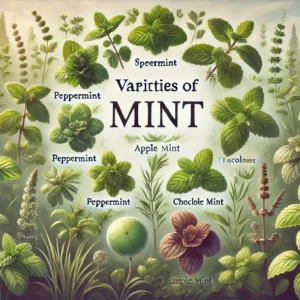Mint is a beloved herb known for its refreshing taste and numerous health benefits. Used for centuries in both culinary and medicinal practices, mint adds flavor to dishes while offering various health advantages. This article will explore the nutritional profile of mint, its health benefits, and practical ways to incorporate it into your diet.
Nutritional Profile of Mint
Mint is packed with essential nutrients, making it a powerful addition to your diet. Key nutrients in mint include:
- Vitamins: Mint is rich in vitamins A and C, which are essential for immune function and skin health.
- Minerals: It contains iron, calcium, magnesium, and potassium, which support various bodily functions.
- Antioxidants: Mint is loaded with antioxidants that help protect the body from oxidative stress and inflammation.
Health Benefits of Mint
- Aids Digestion
Mint is well-known for its ability to soothe the digestive tract. The menthol in mint relaxes the muscles of the digestive system, reducing symptoms of indigestion and bloating. Studies have shown that mint can be effective in alleviating symptoms of Irritable Bowel Syndrome (IBS) by reducing abdominal pain and discomfort. - Improves Respiratory Health
The menthol in mint acts as a natural decongestant, helping to relieve nasal congestion and improve airflow. Mint can be particularly beneficial for individuals suffering from colds, allergies, or asthma. It helps clear the respiratory tract and provides relief from symptoms. - Boosts Immunity
Mint’s high vitamin C content supports the immune system by enhancing the body’s ability to fight infections. The antioxidants in mint also play a crucial role in boosting immunity and protecting the body against harmful pathogens. - Enhances Cognitive Function
Research suggests that mint can improve memory and cognitive function. The aroma of mint has been found to increase alertness and improve focus. Mint is commonly used in aromatherapy to enhance mental clarity and concentration. - Reduces Stress and Anxiety
Mint has soothing properties that help reduce stress and anxiety. The menthol in mint acts as a natural muscle relaxant, providing a calming effect on the body and mind. Drinking mint tea or inhaling its aroma can help alleviate stress and promote relaxation. - Supports Oral Health
Mint’s antibacterial properties make it an excellent herb for maintaining oral hygiene. It helps kill bacteria in the mouth, preventing bad breath and promoting healthy gums. Mint is a common ingredient in toothpaste and mouthwash for its refreshing and cleansing effects.
How to Incorporate Mint into Your Diet
- Fresh Mint Leaves
Adding fresh mint leaves to your diet is easy and beneficial. You can chop them up and add them to salads for a refreshing flavor. Fresh mint also makes a great garnish for various dishes and beverages, enhancing both taste and presentation. - Mint Infused Water
Mint-infused water is a simple and delicious way to stay hydrated. To make it, add a handful of fresh mint leaves to a pitcher of water and let it steep for a few hours. This refreshing drink can aid digestion and keep you hydrated throughout the day. - Mint Tea
Brewing mint tea is another excellent way to enjoy the benefits of mint. Use fresh or dried mint leaves to make a soothing and aromatic tea. Mint tea is known for its calming effects and can help with digestion and relaxation. - Smoothies and Juices
Adding mint to smoothies and juices can enhance their flavor and nutritional value. Blend fresh mint leaves with fruits and vegetables to create a refreshing and healthy drink. Mint pairs well with ingredients like cucumber, lemon, and berries. - Mint Sauces and Dips
Mint-based sauces like mint chutney or tzatziki are delicious additions to meals. These sauces can complement grilled meats, vegetables, and sandwiches, adding a burst of flavor and freshness. - Desserts and Baked Goods
Mint can be a delightful addition to desserts and baked goods. Try adding chopped mint to chocolate chip cookies, brownies, or ice cream. The combination of mint and chocolate is a classic favorite that never disappoints. - Cooking with Mint
Mint can enhance the flavor profile of various savory dishes. Add fresh mint to lamb or chicken recipes for a unique twist. Mint also pairs well with grains like couscous and quinoa, adding a refreshing element to these dishes.
Conclusion
Mint is a versatile herb that offers numerous health benefits and can be easily incorporated into your diet. From aiding digestion to boosting immunity and reducing stress, mint is a powerful addition to any meal. By using the tips and recipes provided, you can enjoy the refreshing taste of mint while reaping its many health benefits. Make mint a regular part of your diet and experience the positive impact it can have on your overall well-being.
References
- Healthline: Mint: Health Benefits, Nutrition, and Uses
- WebMD: Health Benefits of Mint
- Medical News Today: What Are the Benefits of Peppermint Tea?



